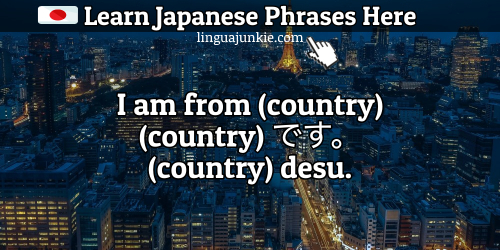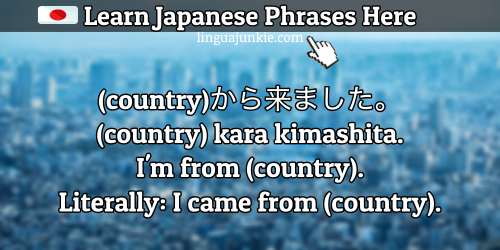Where are you from in Japanese?
Do you know how to ask and answer this?
You should! You’ll need it for simple Japanese conversations.
Here’s how. There are multiple ways to ask this question. In this guide, you’ll learn 11+ phrases total. You learn 5 ways to ask and 6 ways to answer this question. Sound good?
Good. Keep reading. It’ll take a minute or two.
By the way, since you’re learning Japanese…
…you NEED to LISTEN to Japanese.
So, here’s a fun audio lesson where you’ll learn some basic words and greetings. Press play and listen below right now.
- Lesson #2 – Where are you from?
- This fun lesson is by JapanesePod101. Click here to get MORE fun lessons.
#1 出身はどこですか
- Where are you from?
- 出身はどこですか
- Shusshin wa doko desu ka.
- Literal translation: Where is your origin?

Let’s break down this question
- Shusshin – Origin
- Wa – topic marker (can be translated as “is” here)
- Doko – where
- Ka – question marker
So, “shusshin” means “place you are from” or “origin” in terms of your country or city. But when translated to English, instead of saying “Where is your origin,” this phrase is translated to “Where are you from?”
Now, there’s a more polite way to ask Where are you from in Japanese.
Chances are, you’ll hear this.
2. ご出身はどちらですか
- Literal translation: Where is your origin?
- ご出身はどちらですか
- go-Shusshin wa doko desu ka.
Yes, all we did here is add “go” to shusshin.” Adding this “go” makes nouns super polite. Don’t worry about learning this just yet.
3. どこから来ましたか。
- Where did you come from?
- どこから来ましたか。
- Doko kara kimashita ka?

Let’s break this question down.
- Doko – where
- Kara – from
- Kimashita (past tenses of the verb “Kuru” which means “to come”) – came
- ka – question marker
4. どちらの国の方ですか。
- What country are you from?
- どちらの国の方ですか。
- Dochira no kuni no kata desu ka?

Let’s break this all down.
- Dochira – polite version of doko
- kuni – country
- kata – this has many definitions. Here, it’s the polite way of saying “person”
“Kuni” means “country” and “dochira” is a polite form of “doko” or “where.” So, here, they’re just asking what country you’re from in a polite way.
There’s a more casual form of this.
5. どこの国の人?
- Which country are you from?
- Literally: Of what/where country’s person?
- どこの国の人?
- Doko no kuni no hito?

Let’s break down these words.
- Doko – where
- no – possessive particle
- kuni – country
- hito – person
Literally, they’re asking “what country person?” Remember, “hito” means person.
Okay, you know how to ask Where are you from in Japanese.
Now, how do you answer this question?
Think about English. You can say “I’m from the US.” You can say “I’m American.” Or, “I came from Italy.” There are plenty of ways to answer, depending on your style.
So here are a bunch of ways to answer Where are you from in Japanese. Plus, knowing how to say this is will also help you learn how to introduce yourself in Japanese
6. (country) です。
- I am from (country)
- (country) です。
- (country) desu.

Here, you’re just literally saying “America” or “Australia.” This is a quick and casual way to answer the question. So, you can say…
- アメリカ です。
- Amerika desu.
- I’m from the U.S.
- オーストラリアです。
- Oosutoraria desu.
- I’m from Australia
You can use this when someone asks you about your “shusshin”
By the way, below is a list of countries in Japanese to help you fill in the blank.
| Japanese | English | Romanized |
| アメリカ | United States | Amerika |
| アルゼンチン | Argentina | Aruzenchin |
| オーストラリア | Australia | Oosutoraria |
| ブラジル | Brazil | Burajiru |
| ブルガリア | Bulgaria | Burugaria |
| カナダ | Canada | Kanada |
| 中国 | China | Chuugoku |
| チェコ | Czech Republic | Cheko |
| デンマーク | Denmark | Denmaaku |
| オランダ | The Netherlands | Oranda |
| フィリピン | Philippines | Firipin |
| イギリス | England | Igirisu |
| フィンランド | Finland | Finrando |
| フランス | France | Fransu |
| ドイツ | Germany | Doitsu |
| ギリシャ | Greece | Girisha |
| ハンガリー | Hungary | Hangarii |
| インド | India | Indo |
| インドネシア | Indonesia | Indoneshia |
| イタリア | Italy | Itaria |
| 日本 | Japan | Nihon |
| 韓国 | Korea | Kankoku |
| メキシコ | Mexico | Mekishiko |
| モロッコ | Morocco | Morokko |
| ノルウェー | Norway | Noruwee |
| パキスタン | Pakistan | Pakistan |
| パナマ | Panama | Panama |
| ポーランド | Poland | Poorando |
| ポルトガル | Portugal | Portugaru |
| ルーマニア | Romania | Ruumania |
| ロシア | Russia | Roshia |
| シンガポール. | Singapore | Shingapooru |
| スロバキア | Slovakia | Surobakia |
| 南アフリカ | South Africa | Minami Afurika |
| スペイン | Spain | Supein |
| スウェーデン | Sweden | Sweeden |
| タイ | Thailand | Tai |
| トルコ | Turkey | Toruko |
| ウクライナ | Ukraine | Ukuraina |
| ベトナム | Vietnam | Betonamu |
Or, you can use the next answer.
7. (country)しゅっしんです。
- Literally: (country) origin
- (country)しゅっしんです。
- (country) shusshin desu.

So, yes, you can just say “Amerika shusshin desu.” This is a very casual answer.
Another variation you can use is this one below.
A bit more polite since you’re speaking in fuller sentences.
8. 私は(country) 出身です。
- I am from (country) .
- 私は(country) 出身です。
- Watashi wa (country) shusshin desu.

Here’s another slight variation. Don’t worry, not much difference in meaning.
9. My origin is (country).
- My origin is (country).
- 私の出身は(country)です。
- Watashi no shusshin wa (country) desu.
10. (nationality人) です。
- I am (nationality).
- (nationality人) です。
- (nationality Jin) desu.

Here, you’re literally saying “I’m American” or “I’m Australian.”
In Japanese, nationalities and ethnicities usually end with the character “人” which here is read as “jin.”
For example:
- アメリカ人 – Amerikajin – American
- 韓国人– Kankokujin – Korean
- スペイン人 – Supeinjin – Spanish (from Spain)
- オーストラリア人 – Oosutorariajin– Australian
Here’s a full list of nationalities in Japanese.
| Japanese | English | Romanized |
| アメリカ人 | American | Amerikajin |
| アルゼンチン人 | Argentinian | Aruzenchinjin |
| オーストラリア人 | Australian | Oosutorariajin |
| ブラジル人 | Brazilian | Burajirujin |
| ブルガリア人 | Bulgarian | Burugariajin |
| カナダ人 | Canadian | Kanadajin |
| 中国人 | Chinese | Chuugokujin |
| チェコ人 | Czech | Chekojin |
| デンマーク人 | Danish | Denmaakujin |
| オランダ人 | Dutch | Orandajin |
| フィリピン人 | Filipino | Firipinjin |
| フィンランド人 | Finnish | Finrandojin |
| フランス人 | French | Fransujin |
| ドイツ人 | German | Doitsujin |
| ギリシャ人 | Greek | Girishajin |
| ハンガリー人 | Hungarian | Hangariijin |
| インド人 | Indian | Indojin |
| インドネシア人 | Indonesian | Indoneshiajin |
| イタリア人 | Italian | Itariajin |
| 日本人 | Japanese | Nihonjin |
| 韓国人 | Korean | Kankokujin |
| メキシコ人 | Mexican | Mekishikojin |
| モロッコ人 | Moroccan | Morokkojin |
| ノルウェー人 | Norwegian | Noruweejin |
| パキスタン人 | Pakistani | Pakistanjin |
| パナマ人 | Panamanian | Panamajin |
| ポーランド人 | Polish | Poorandojin |
| ポルトガル人 | Portuguese | Portugarujin |
| ルーマニア人 | Romanian | Ruumaniajin |
| ロシア人 | Russian | Roshiajin |
| シンガポール人. | Singaporean | Shingapoorujin |
| スロバキア人 | Slovakian | Surobakiajin |
| 南アフリカ人 | South African | Minami Afurikajin |
| スペイン人 | Spanish (Spain) | Supeinjin |
| スウェーデン人 | Swedish | Sweedenjin |
| タイ人 | Thai | Taijin |
| トルコ人 | Turkish | Torukojin |
| ウクライナ人 | Ukrainian | Ukurainajin |
| ベトナム人 | Vietnamese | Betonamujin |
11. (country)から来ました。
Or, you can also say… “I came from (country)” if they ask you “Doko kara kimashita ka?”
- (country)から来ました。
- (country) kara kimashita.
- I’m from (country).
- Literally: I came from (country).

Conclusion – Back to You
That’s it!
Now you know how to ask where are you from in Japanese.
You also know how to answer the question. You know nationalities and countries in Japanese.
So, if someone asks you, “Shusshin wa doko desu ka,” you will be able to give an answer.
And now, you know a whole lot more Japanese than before.
– Written by the Main Junkie
P.S. Want to speak Japanese with an easy 3 minute lesson?
Then check out JapanesePod101.com. They have 3-10 minute audio/video lessons that get you speaking and understanding Japanese. So, if you want to speak and learn this language… click here to get a Free Lifetime Account at JapanesePod101.com
I got the message
okay
I cant beileve
[…] This is how you say “what’s your nationality” or “where are you from” in Japanese. […]
How do you say if you are from England and that you are English?
these explanations are very useful.